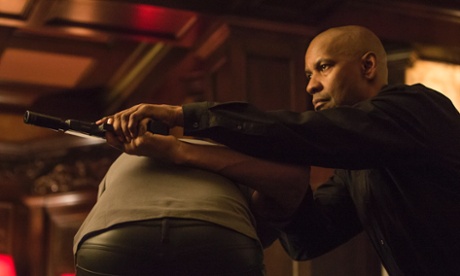
The vengeance-seeking vigilante is one of Hollywood’s more iconic creations, even if he’s never been given an easy ride. When Dirty Harry was taking audiences by storm in 1971, Pauline Kael dismissed it as “fascist medievalism”, and the morality of such films remains a well-contested topic. Today’s equivalents, though, inspire no such discussion. The antihero has been allowed to grow a heart, meaning Hollywood is no longer doing its vigilantes justice.
The genre’s latest offering is The Equalizer, in which Denzel Washington plays a softly spoken bookworm with an extracurricular predilection for, in Travis Bickle parlance, washing scum off the streets. By day, he staffs a hardware store and is soon putting its inventory to good use on some Russian mobsters who rough up a young prostitute he’s become chummy with at the local all-night diner.
The film, you may be surprised to hear, is no masterpiece, though there’s no shortage of good, clean fun to be had as one tattooed goon after another is terminated with extreme prejudice. And yet that’s exactly the problem: vigilante films were never supposed to be this fun. Eschewing the state-run justice system and siding with a bloodthirsty sociopath isn’t meant to be a wholly pleasant movie-going experience.
The genre’s standard-bearers – Dirty Harry, Taxi Driver, even Death Wish – succeeded by presenting their main men as proper antiheroes, guys who roused and repelled in equal measure, not just badasses with a grievance. Harry Callahan’s initial takedown scene has become hall-of-fame stuff, but it’s the sheer terror of the punk staring down Clint Eastwood’s magnum that makes for such startling viewing. That film also goes to pains to draw parallels between our supposed hero and his child-killing nemesis, while Death Wish made a point of explicitly placing its protagonist at odds with civilised society. Three decades on, as Washington dispenses paternal wisdom to the sweet young lady soon to be beaten to a bloody pulp by vodka-swilling hoodlums, there’s little question as to which direction our sympathies are being funnelled.
The violence in The Equalizer, it has to be said, is pleasingly unflinching (and innovative, too – corkscrews, mallets and even shot glasses are variously deployed to mutilate), but it’s there to be relished, not ruminated on. If the presence of a teenage hooker is a reminder of our genre territory, then any parallels with Taxi Driver remain superficial. Where De Niro unsettled, Denzel merely soothes.
The Equalizer is far from the only recent film guilty of granting its central scumbag too much sympathy. Liam Neeson’s ever-expanding portfolio of earnest triggermen never have us thinking twice about our principles, and the same applies to the law-shunning protagonists of Man on Fire, Law Abiding Citizen, Outlaw and The Brave One, to name but four from recent years. Each film is happy to follow the narrative template of their forerunners, but will accept none of the thematic weight. The trailer for Keanu Reeves’ absurd-looking new film John Wick promises more of the same: swaths of suited-up thugs gunned down in sexy slo-mo. All well and good, but today’s vigilantes are superheroes, not antiheroes.
There are honourable exceptions. Eastwood himself might have bottled it by revealing Gran Torino’s racist ’Nam vet to be nothing more than a lovable rogue in the end, but Michael Caine resisted doing the same with his deliciously nasty Harry Brown, with Hugh Jackman’s ferocious survivalist in last year’s Prisoners a similarly unnerving presence. But these are few and far between. The fact remains that Hollywood’s vigilantes have gone soft.
Oddly, today’s justice-seekers provoke none of the controversy of their predecessors despite being infinitely more worthy of Kael’s reproach. Harry Callahan may have drawn us to the dark side, but at least he made us check ourselves first and when we did side with the killer, we did so against our better instincts. Now, when Liam Neeson unloads his pistol into the face of another Balkan sex trafficker, we watch on with glee rather than guilt. If anything, the genre’s politics are becoming even more medieval. Today’s vigilantes could do with reading up on their history – and learning how to do their jobs properly.
• First-look review: The Equalizer

